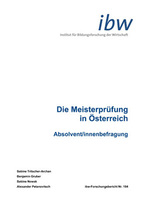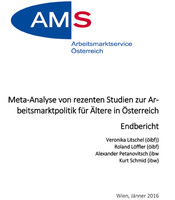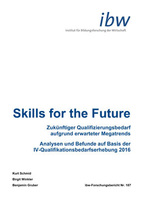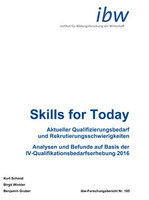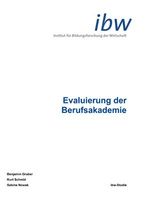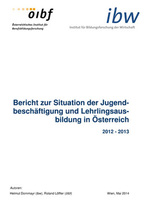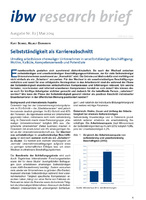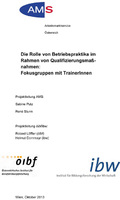Der „Meister“ hat im handwerklichen Bereich eine lange Tradition und eine ebenso große Bedeutung. Mit der Meisterqualifikation wird ein hoher qualifikatorischer Anspruch verbunden: Inhaber/innen sollen über eine hohe Fachkompetenz verfügen, damit sie in leitender Funktion die Durchführung komplexer Aufgaben, oftmals mit nicht vorhersehbaren Herausforderungen, verantworten können. Zudem sollen sie durch die Prüfung befähigt werden, ein Unternehmen zu gründen/zu führen und Lehrlinge auszubilden. Auf Basis vorhandener Daten – die Meisterqualifikation wird, da ihr keine formale Ausbildung zugrunde liegt, in den Bildungsstatistiken nicht oder nur ungenau erfasst – ließ sich bislang nicht belegen, ob sich dieser qualifikatorische Anspruch auch tatsächlich realisiert. Die Ergebnisse der Absolvent/innenbefragung untermauern dies jedoch: Als Folge der Meisterprüfung steigen Absolvent/innen, die ihr fachliches Fundament mehrheitlich im Rahmen einer facheinschlägigen Erstausbildung und einer jahrelangen betrieblichen Praxis erworben haben, sehr häufig in höhere Positionen mit mehr Leitungs- und Entscheidungsbefugnisse auf. Viele von ihnen machen sich aber auch durch Neugründung bzw. Betriebsübernahme selbstständig. Die durch diesen empirischen „Realitätscheck“ gewonnenen Daten und Fakten zeigen, dass die Meisterqualifikation ihrer Zielsetzung durchaus gerecht wird. Zudem lassen sie die Einordnung dieses Abschlusses auf Niveau 6 des NQR, das derzeit mehrheitlich für den „Meister“ diskutiert wird, berechtigt erscheinen.
The “master craftsperson” position has a long tradition and is of major importance in the sphere of skilled crafts and small businesses. The master craftsperson qualification pursues high objectives: its holders should have comprehensive specialist competence enabling them to take on responsibility in an executive position for carrying out complex tasks, often combined with tackling unforeseeable challenges. The exam additionally aims to demonstrate that master craftspersons can set up/manage a company and train apprentices. Based on available data – the master craftsperson qualification is not covered at all, or only vaguely, in education statistics as it does not build on any formal education and training pathway – it has not been possible to date to prove whether the qualification’s high objective is actually achieved. But the results of the graduates’ survey1 confirm this: after passing the master craftsperson exam, graduates who have in their majority acquired their specialist foundation by completing an occupation-specific initial vocational education and training (IVET) pathway and several years of company practice very frequently advance to higher-level positions with more managerial and decision-making powers. But many of them also become self-employed by setting up their own company or taking over a business. The facts and figures obtained by this empirical “reality check” show that the master craftsperson qualification indeed fulfils these objectives. In addition, based on this data, it seems legitimate to allocate this qualification to Level 6 of the NQF – a classification which is demanded by a majority of participants in current discussions on the master craftsperson qualification.
